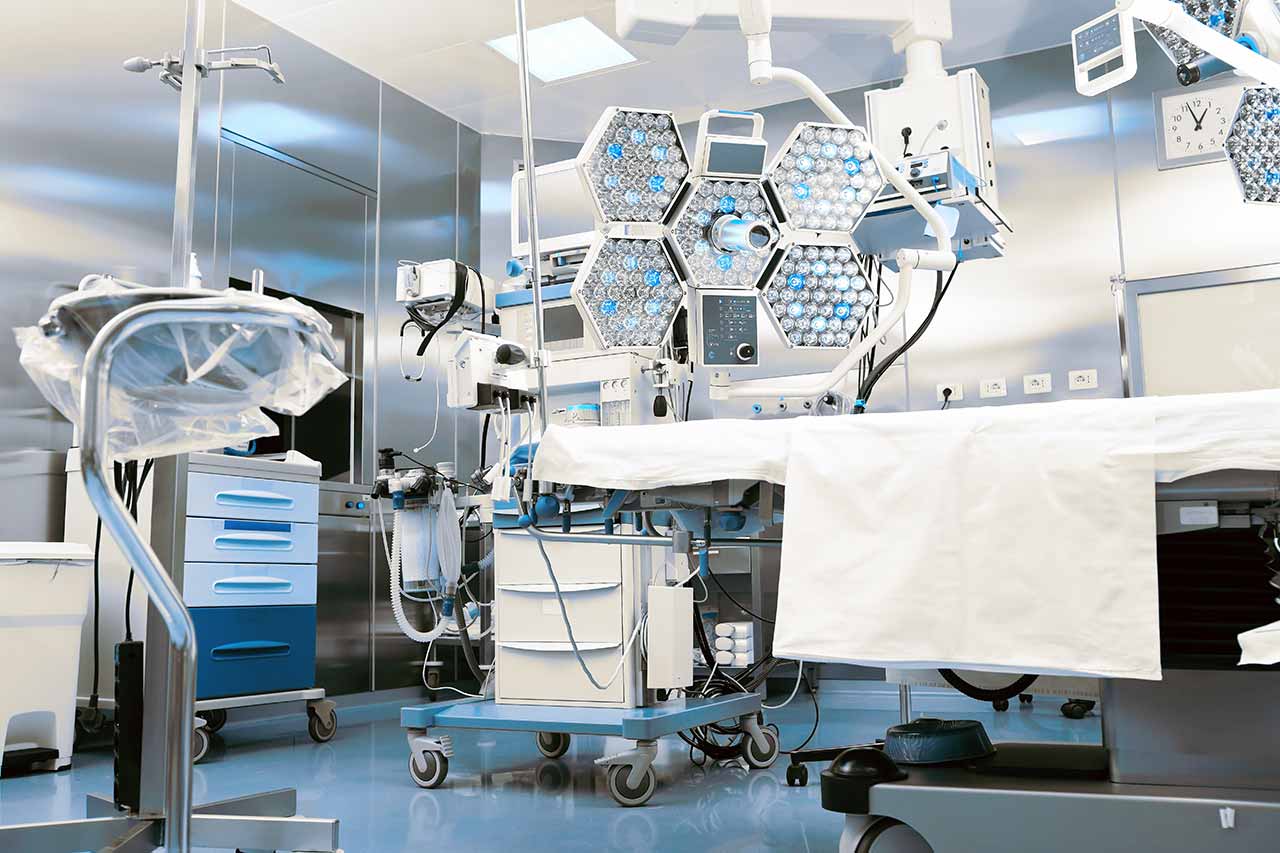
The program includes:
- Initial presentation in the clinic
- clinical history taking
- review of medical records
- physical examination
- laboratory tests:
- complete blood count
- general urine analysis
- biochemical analysis of blood
- inflammation indicators (CRP, ESR)
- indicators blood coagulation
- neurological examination
- functionality x-ray
- CT/MRI scan
- neuropsychological tests (on indications):
- ENMG (electroneuromyography)
- EEG (electroencephalography)
- SEPs (somatosensory evoked potentials)
- VEPs (visually evoked potentials)
- BAEP tests (brainstem auditory evoked potential)
- preoperative care
- microsurgical resection of acoustic neuroma
under neuronavigation - histologically examination of the remote tissues
- postoperative MRI control
- symptomatic treatment
- control examinations
- the cost of essential medicines and materials
- nursing services
- full hospital accommodation
- developing of further guidance
Required documents
- Medical records
- MRI/CT scan (not older than 3 months)
- Biopsy results (if available)
Service
You may also book:
 BookingHealth Price from:
BookingHealth Price from:
About the department
The Department of Adult and Pediatric Neurosurgery, Spinal Surgery at the Hospital Kassel performs all modern surgical interventions to treat diseases of the brain and spinal cord, as well as peripheral nerves. In addition, the department's medical team specializes in the surgical treatment of spinal diseases. The department's clinical priorities include the treatment of brain tumors, skull base surgery, surgical treatment of neurovascular diseases, spinal diseases, as well as the treatment of neurosurgical pathologies in children. During the treatment of patients with neurosurgical disorders, the specialists of the department work closely with doctors from the Departments of Neurology, Interventional Neuroradiology, as well as pediatric neurologists in order to provide comprehensive treatment. The department is the only Neurosurgery Center in North Hesse and has 42 beds for inpatient treatment. It performs more than 1,400 surgical interventions every year. Whenever possible, the surgeons use minimally invasive techniques, which greatly facilitate the patient's postoperative recovery. If complex surgical procedures are required, the progressive CT and MRI scanners are used for preliminary planning. The department is headed by Prof. Dr. med. Wolfgang Deinsberger.
The department's medical team has a rich and successful experience in the surgical treatment of brain tumors, which are one of the most common pathologies of the nervous system. Making an accurate diagnosis and determining the exact location, size and stage of the tumor require the high-quality diagnostics using advanced imaging equipment, which is carried out in cooperation with the Departments of Radiology, Neuroradiology and Nuclear Medicine. Depending on the medical history and symptoms, the patient may be indicated such diagnostic examinations as computed tomography, magnetic resonance imaging, including functional MRI, MRI-PET, MRI spectroscopy and MRI tractography, electroencephalography, PET-CT, SPECT, angiography, cerebrospinal fluid testing, cytological examination, etc. After obtaining all the necessary diagnostic data, the doctors of the department begin to develop the optimal treatment regimen. The treatment methods for brain tumors are not much different from those used in the treatment of tumors of other localization. The treatment is based on surgery, chemotherapy and radiation therapy. If the patient agrees, he can undergo immunotherapy within the framework of clinical trials. The specific type of brain tumor determines the sequence in which one or another therapeutic technique will be used. In the course of neurosurgical interventions to remove a brain tumor, the surgeons use cutting-edge operating microscopes, which contribute to the maximum safety of surgical procedures, eliminating trauma to vital structures of the brain. In addition, the department's operating rooms are equipped with intraoperative ultrasound systems, neuronavigation systems, intraoperative monitoring systems, 5-aminolevulinic acid (5 ALA) fluorescent navigation devices, ultrasonic scalpels, endoscopic instruments and other progressive devices. All of the above devices allow each surgical procedure to be performed with pinpoint precision, which is especially important in the course of brain surgery.
In the field of vascular neurosurgery, the main focus is on the treatment of patients with vascular malformations of the brain and spinal cord, such as cerebral aneurysms, atrioventricular angiomas, cavernomas, dural atrioventricular fistulas, etc. Both diagnostics and treatment of vascular neurosurgical diseases are carried out in close cooperation with specialists from the Department of Diagnostic and Interventional Neuroradiology. The first stage of diagnosis is CT or MRI scanning followed by cerebral and spinal cord angiography. Depending on the specific diagnosis and the degree of vascular lesions, the specialists can perform either open or endovascular surgery.
A special place in the department's clinical practice is given to the surgical treatment of spinal diseases. The department's neurosurgeons most often perform surgery to treat lumbar and cervical disc herniation, lumbar spinal stenosis, spondylodiscitis, as well as benign spinal tumors (extradural, intradural and intramedullary) and metastases in the spine, which mostly develop due to breast and prostate cancer.
The department also deals with the treatment of children with various neurosurgical diseases, including craniosynostosis, spina bifida, hydrocephalus, brain tumors, cerebral vascular malformations, brain and spinal cord injuries. When developing a treatment plan for a child with a neurosurgical disease, the department's specialists always take into account his age and the characteristics of a growing child's body in order to exclude impairments in the child's development in the future. The physicians from related medical disciplines, for example, pediatricians, pediatric neurologists, pediatric oncologists and others are often involved in the therapeutic process.
The department specializes in the diagnostics and treatment of the following neurosurgical diseases:
- Brain, skull base and pituitary tumors
- Trigeminal neuralgia and facial spasms
- Cerebrovascular diseases
- Cerebral aneurysms
- Atrioventricular angiomas
- Cavernomas
- Dural atrioventricular fistulas
- Cerebrovascular occlusive diseases (stenosis, Moyamoya disease, intracranial bleeding)
- Cerebrospinal fluid circulatory disorders (hydrocephalus)
- Tumors and degenerative diseases of the cervical, thoracic and lumbar spine
- Traumatic brain injuries and spinal injuries
- Peripheral nerve tumors, compression syndromes and damage
- Pediatric neurosurgical diseases
- Brain tumors
- Brain malformations (arachnoid cysts, Chiari malformation, Dandy-Walker malformation)
- Spinal cord malformations (spina bifida, myelomeningocele, tethered cord syndrome)
- Vascular malformations (atrioventricular angiomas, cavernomas)
- Hydrocephalus
- Skull malformations (craniostenosis)
- Traumatic brain injuries, spinal injuries
- Spasticity
- Peripheral nerve injuries
- Other diseases of the central and peripheral nervous system
Photo of the doctor: (c) Klinikum Kassel
About hospital
The Hospital Kassel is a progressive medical facility with a huge medical team, which provides high-quality medical services in all branches of modern medicine. The hospital is part of the regional medical Gesundheit Nordhessen Holding, which unites 5 top-class medical centers, including specialized rehabilitation clinics. With 1,281 beds, the hospital is known as the largest medical complex in the federal state of Hesse. The hospital has 32 specialized departments with highly qualified doctors and specially trained nursing staff in each department. The team of 3,200 employees takes care of the health of patients. The main value for each employee is the patient's health. The professional skills of the medical staff in combination with state-of-the-art medical and technical equipment of the hospital provide excellent opportunities for the treatment of patients with pathologies of any severity.
The hospital provides treatment to over 55,000 inpatients and about 140,000 outpatients every year. Medical care is provided to both German citizens and many patients from foreign countries. Such high rates are the evidence of excellent quality of medical services and the high credit of patients' trust.
The hospital has created a wonderful atmosphere, which contributes to the rapid recovery of patients. All diagnostic and therapeutic rooms, operating rooms, as well as patient rooms are designed taking into account modern standards of European medicine in order to ensure maximum comfort of each patient. All employees working in the hospital provide the patient with understanding and respect, as well as support him in every possible way during the entire therapeutic process.
The hospital successfully implements a quality management system. It uses its own quality management system implemented by the medical Gesundheit Nordhessen Holding, as well as the IQM (Initiative Qualitätsmedizin) monitoring system. As part of healthcare quality management, the hospital annually clearly provides reports on its clinical activities, the success of diagnostics, treatment, level of patient care, etc. Thus, the hospital stands for maximum openness in its work and makes every effort to maintain the highest level of quality of medical care.
Photo: (с) depositphotos
Accommodation in hospital
Patients rooms
The patients of the Hospital Kassel live in comfortable single, double and triple rooms. The patient rooms are made in a modern design and pastel colors. A standard patient room includes an automatically adjustable bed, a bedside table, a wardrobe, a table and chairs for receiving visitors, a TV and a telephone. The patient rooms have Wi-Fi. Each room has an ensuite bathroom with shower and toilet.
The hospital also offers enhanced-comfort patient rooms. Most of these rooms have a balcony. The bathroom additionally includes a hairdryer, towels and toiletries.
Meals and Menus
The patient and the accompanying person are offered tasty and balanced three meals a day. If for some reason you do not eat all foods, you will be offered an individual menu. Please inform the medical staff about your food preferences prior to treatment. The patients staying in enhanced-comfort rooms are provided with an individual menu every day.
The hospital also has several cafes where one can have a cup of tea or coffee, taste delicious pastries, salads, main hot dishes, pizza, etc.
Further details
Standard rooms include:
Religion
The religious services are available upon request.
Accompanying person
During the inpatient program, the accompanying person can live with the patient in a patient room or a hotel of his choice. Our managers will help you choose the most suitable option.
Hotel
During an outpatient program, the patient can stay at the hotel of his choice. Our managers will help you choose the most suitable option.





